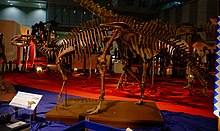Fukuisaurus (meaning "Fukui (Fortunate) lizard") is a genus of herbivorous ornithopod dinosaur that lived during the Early Cretaceous in what is now Japan. The type species is F. tetoriensis, which was named and described in 2003.[1]
| Fukuisaurus Temporal range: Early Cretaceous,
| |
|---|---|

| |
| Reconstructed skeleton | |
| Scientific classification | |
| Domain: | Eukaryota |
| Kingdom: | Animalia |
| Phylum: | Chordata |
| Clade: | Dinosauria |
| Clade: | †Ornithischia |
| Clade: | †Neornithischia |
| Clade: | †Ornithopoda |
| Clade: | †Ankylopollexia |
| Clade: | †Styracosterna |
| Genus: | †Fukuisaurus Kobayashi & Azuma, 2003 |
| Species: | †F. tetoriensis
|
| Binomial name | |
| †Fukuisaurus tetoriensis Kobayashi & Azuma, 2003
| |
Discovery and naming
editRemains of Fukuisaurus were discovered in 1989, in Katsuyama, Fukui Prefecture, in rocks from the Kitadani Formation, dating to the Barremian. The type species, Fukuisaurus tetoriensis, was described in 2003 by Yoshitsugu Kobayashi and Yoichi Azuma. The genus name refers to Fukui; the specific name to the geological Tetori Group. The type specimens or cotypes are FPDM-V-40-1, a right maxilla, and FPDM-V-40-2, a right jugal. Further elements of a skull and a right sternal plate had been recovered.[1] Since 2003 much more extensive finds have been made and much of the skeleton is now known.[2][3]
Description
editFukuisaurus was a relatively small ornithopod. In 2010 Gregory S. Paul estimated its length at 4.5 meters and its weight at 400 kg.[4] Being a bipedal, optionally quadrupedal, animal, it was similar in general build to Iguanodon, Ouranosaurus and Altirhinus. According to the describers Fukuisaurus was exceptional in that its skull was not kinetic: the tooth-bearing maxilla would be so strongly fused to the vomer that a sideways chewing motion would have been impossible.[1]
Classification
editFukuisaurus was assigned by its describers to Iguanodontia, although the presence of a posterolateral process of the sternum indicated that it likely also belongs to Styracosterna. Their cladistic analysis showed that Fukuisaurus was more derived than Iguanodon and Ouranosaurus, but less derived than Altirhinus.[1] Ramírez-Velasco et al. (2012) found Fukuisaurus to be a basal member of Hadrosauroidea,[2] while Bertozzo et al. (2017) recovered it as a non-hadrosauroid styracostern.[3]
References
edit- ^ a b c d Kobayashi, Y. and Azuma, Y. (2003). "A new iguanodontian (Dinosauria; Ornithopoda), form the lower Cretaceous Kitadani Formation of Fukui Prefecture, Japan". Journal of Vertebrate Paleontology 23(1): 166-175
- ^ a b Angel Alejandro Ramírez-Velasco; Mouloud Benammi; Albert Prieto-Márquez; Jesús Alvarado Ortega; René Hernández-Rivera (2012). "Huehuecanauhtlus tiquichensis, a new hadrosauroid dinosaur (Ornithischia: Ornithopoda) from the Santonian (Late Cretaceous) of Michoacán, Mexico". Canadian Journal of Earth Sciences. 49 (2): 379–395. Bibcode:2012CaJES..49..379R. doi:10.1139/e11-062.
- ^ a b Bertozzo, Filippo; Dalla Vecchia, Fabio Marco; Fabbri, Matteo (2017). "The Venice specimen of Ouranosaurus nigeriensis (Dinosauria, Ornithopoda)". PeerJ. 5 (e3403): e3403. doi:10.7717/peerj.3403. PMC 5480399. PMID 28649466.
- ^ Paul, G.S., 2010, The Princeton Field Guide to Dinosaurs, Princeton University Press p. 286